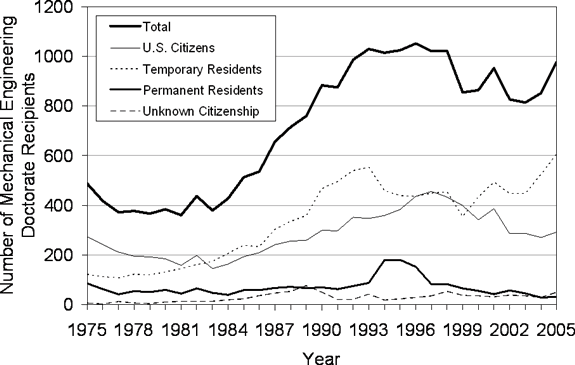Research on Mechanical Engineering Focus of NAS Report
While the U.S. leadership in mechanical engineering basic research is strong, the supply of U.S. mechanical engineers is in jeopardy.
Latest News
November 5, 2007
By DE Editors
While the U.S. leadership in mechanical engineering basic research is strong, the supply of U.S. mechanical engineers is in jeopardy.
Findings released in a 2-page Report Brief, “Benchmarking the Competitiveness of the United States in Mechanical Engineering Basic Research,” published October 2007 by the National Academies (NAS; Washington, DC), rate the competitive standing of U.S. mechanical engineering basic research relative to other regions or countries.
|
In addition to including key factors that influence U.S. performance in mechanical engineering research, it reports that near- and longer-term projections of research leadership show that while the U.S. leadership in mechanical engineering basic research overall will continue to be strong, and the contributions of U.S. mechanical engineers to journal articles will increase, so will the contributions from other growing economies such as China and India.
At the same time, the supply of U.S. mechanical engineers is in jeopardy, because of declines in the number of U.S. citizens obtaining advanced degrees and uncertain prospects for continuing to attract foreign students. U.S. funding of mechanical engineering basic research and infrastructure will remain level, with strong leadership in emerging areas.
Like other science and engineering disciplines, the field of mechanical engineering is facing issues of identity and purpose as it continues to expand beyond its traditional core into biology, materials science, and nanotechnology. Concerns about educating students, future employment opportunities, and the fundamental health of the discipline and industry are regular topics of discussion in the mechanical engineering community.
To understand the current health and international standing, the report states, it is first imperative to address questions of how mechanical engineering must shift to meet the challenges that lie ahead for the future position of mechanical engineering and its basic research needs.
To obtain the Report ($31.50), go to the National Academies.
Sources: Press materials received from the company and additional information gleaned from the company’s website.
Subscribe to our FREE magazine, FREE email newsletters or both!
Latest News
About the Author
DE’s editors contribute news and new product announcements to Digital Engineering.
Press releases may be sent to them via [email protected].







